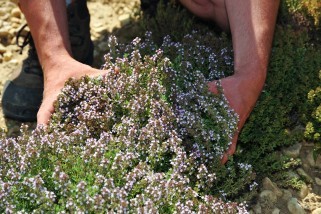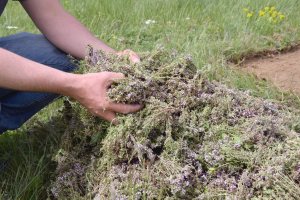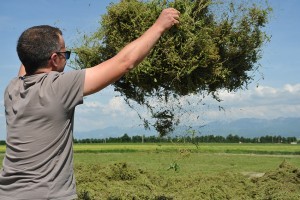What should be known about our Sweet Thyme from Drôme?
THYME

Thyme is an aromatic plant native to Southern Europe, its name comes from the Greek "Thymos" which means to perfume and the word "Thymon" which the definition oscillates between "smoke" and "spirit". This is because the Thyme was previously burned during religious rites. The story goes that the Thyme was born from the tears of Helen of Troy. It is also said that the Romans used it to perfume themselves or to purify the air.
Its leaves are small and narrow, of a greyish green colour. Its pale pink, white or purple flowers are rich in essential oils. Thyme flowers almost all year round, but it is nevertheless when it is picked between spring and summer that it is most fragrant. The Thyme is a bushy sub-shrub with evergreen foliage found mainly in dry, rocky soils. Its cultivation is therefore frequent in the western Mediterranean basin, from Spain to Italy. The Thyme can measure between 10 and 30 cm in height. This plant, also known as "Farigoule" in the south of France, belongs to the Lamiaceae family.
Thyme has several chemotypes, a mixture of distinct aromatic components within the same species. The chemotype is a kind of plant identity card listing its components, characteristics, properties, varieties, etc. The many chemotypes of the Thyme can be explained by the influences that its ecosystem has undergone (altitude, humidity, sunshine, etc.). According to its chemotype, Thyme contains an aromatic essence of variable composition. It is the content of Thymol, Linalol, Geraniol or Carvacrol present in the essential oil that varies.
Like its cousin the Wild Thyme, Thyme's plants have various aromas, due to their chemotype. While some have a remarkable freshness or a naturally lemony taste, others have a more musky or even camphorated smell. Some types of Thyme are even so strong that it is difficult to exploit them. Thymes rich in Thymol, and especially their essential oil, should be used with caution because of their caustic nature. They can cause nervous disorders in case of overdose.
Thyme is a plant appreciated for its many uses. It is widely used in infusion to prepare for the winter period. Its characteristic aroma and taste can be combined very well with Lavender or Rosemary as a decoction, for example.
Thyme is known for its antiseptic, antispasmodic and anti-infectious properties. It can be considered as a kind of "natural cleanser". Its virtues will make it possible to clear and clean at the same time:
- Respiratory tract: it is often used to fight colds, bronchitis or rhinopharyngitis
- Digestive tract: it is said that Thyme facilitates digestion, limits flatulence and prevents fermentation
- Wounds: its properties are known to sanitize various wounds (surface) or ulcers
- Teeth: it is often said that Thyme strengthens the gums, disinfects breath and prevents cavities
- The body in general: Thyme helps to eliminate and cleanse the body of toxins from the body
Thyme also has other properties: hairdressers recommend its use to strengthen and tone the scalp but also to prevent hair loss and help hair grow. If it is stimulating from a capillary point of view, the Thyme also awakens the brain. This plant has a reputation for stimulating intelligence and overcoming drowsiness to get back to work faster. Finally, Thyme is also found in cosmetics.
The use of this plant is not limited to the resolution of various pains or to the cosmetic field. It is also popular in the culinary arts. Its unique taste totally justifies its use as a condiment plant. Adding Thyme to your recipes will allow you to give pep to your dishes. It is used in a lot in sauces but can also be sprinkled in soups, vegetable gratins, fish, fresh cheeses, etc. It is often found with olive oil and garlic, their Provençal flavours matching very well.
THE THYME OF YOUR HERBAL TEA
Genus: Thymus Vulgaris at Linalol
Family: Lamiaceae
Species: Perennial plant, with whole leaf blade
We have chosen to use Thymus Vulgaris with Linalol in our Sweet Thyme from Drôme herbal infusion. This type of thyme is characterized by the excellent quality of its essential oil. Its aromatic aroma and very sweet taste, without pungency, give it incomparable organoleptic properties. The finesse and floral flavours of this Thyme are more pronounced than those of the other varieties.
THE PRODUCER
PAGÈS Sweet Thyme from Drôme was produced and harvested on Yannick's land, located in the municipality of CHABEUIL (26), near the Vercors Regional Nature Park. About three years ago, Yannick took over his father's land and is now the only producer to grow Thymus Vulgaris in Linalol.
The harvesting of the Thyme present in your Sweet Thyme from Drôme was carried out on 19 May 2018 by mechanical harvesting. The Thyme harvested that day was placed in a dark place for almost 3 days for the drying process. Dried between 30°C and 40°C, this Thyme was then transported to our premises for the production of the herbal infusion.
THE LAND
Planted in the heart of the Vercors regional natural park, in Auvergne Rhône-Alpes, the Thyme that makes up our Sweet Thyme from Drôme herbal tea grows on ideally sunny land (about 80% of sunshine per year). Thymus Vulgaris in Linalol also needs moist soil.
It is more precisely in the municipality of Chabeuil, a few steps from Valence in the Drôme, that this Thyme was created. A land of excellence for the production of aromatic and medicinal fragrant plants, the Drôme is home to more than 50 species of plants grown in organic agriculture.
These lands benefit mainly from a Mediterranean-type climate, with hot and dry summers and mild and humid winters. If Lavender is the emblematic plant of the region, Thyme, Mint, Clary Sage, Rosemary, Meadowsweet and Basil also enjoy it very well. The presence of these very aromatic plants in the Drôme region gives it the nickname "land of scents". This land is synonymous with Provence, fragrance and mild spring weather.
THE QUALITY
Linalool is typical of this thyme. When cut in spring, its essential oil contains about 80% linalool.








